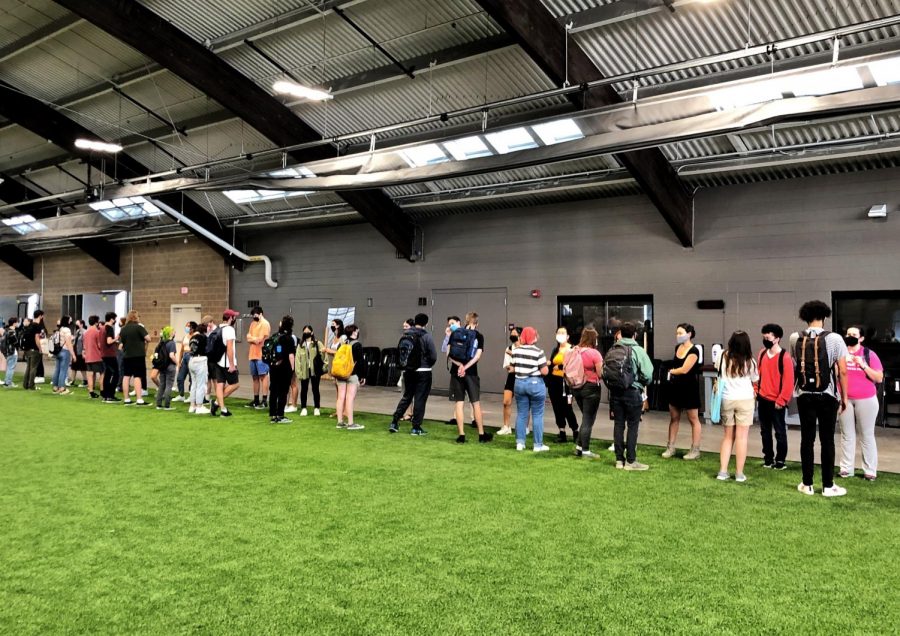SOAR Re-orients Second-Years to Oberlin
Photo courtesy of Nathan Carpenter
Students participating in the Sophomore Opportunities and Academic Resources reorientation program gather for an ice cream social.
After completing an unorthodox first year of college due to the COVID-19 pandemic, second-years are back on campus hoping to find their place at Oberlin. In order to support second-years, many of whom have spent an unprecedented four and a half months away from campus this summer, the Sophomore Opportunities and Academic Resources Program is expanding to offer a “re-orientation.”
While the SOAR program has existed for the past three years, this year’s expansion is aimed to help ground second-years who might be less settled at Oberlin than normal. The program enables second-years to explore opportunities available at Oberlin, build skills, and bond with their peers.
Nathan Carpenter, director of academic peer advising and coordinator for strategic initiatives, stated that the program was restructured and tailored to the specific conditions of this second-year class.
“This year’s SOAR program evolved to meet the needs of this particular sophomore class,” he said. “It’s a month-long program during which students are grappling with complex problems and exploring learning opportunities, especially those opportunities outside the classroom that weren’t available in their first year. It’s also a program that is meant to build community, because that was also very challenging in the context of COVID-19 last year.”
There are three components to this year’s SOAR program. For the first four Sundays of the fall semester, second-years enrolled in the program will participate in core sessions to explore opportunities at Oberlin and plan for upcoming semesters. SOAR will also provide a variety of skill-building workshops including Winter Term planning, and résumé, and cover letter drafting. Finally, the program also offers social and community-building activities. Students that attend the core Sunday sessions along with three skill building workshops of their choosing will receive one co-curricular credit.
The program will welcome various keynote speakers including Peter Baker, chief White House correspondent for The New York Times and Susan Glasser, a staff writer for The New Yorker. Additionally, there will also be presentations from staff members in experiential learning offices, such as the Career Center and the Office of Study Away, to help students explore opportunities available through the College and develop transferable skills such as problem solving and analytical thinking.
SOAR activities commenced on Sunday, Oct. 10. Second-years attended their first core session, which was followed by a “Speed-Friending & Berries and Cream Social.”
College second-year Iago Mendes, who spent his entire first year remote, expressed his excitement about the program.
“The social events are pretty interesting,” he said. “Last Sunday we had an ice cream social and speedfriending, which was cool. Since I wasn’t on campus last semester, it’s a great opportunity for me to meet new people from my class.”
Throughout the week, there have been workshops geared to help second-years acquire certain skills and to introduce them to internships and research opportunities.
Last year, first-years had a nontraditional Winter Term during the month of August in which they attended a pre-orientation Peer Advising Leaders program before they even started classes at Oberlin. According to double-degree second-year Nathaniel Coben, the Winter Term workshop he attended gave him a better understanding of how Winter Term operates and inspired his project idea.
“I wasn’t sure how Winter Term worked but now I understand, and I have an idea in mind about the project I want to do,” he said. “I’m actually pretty excited about it because my project is something I’ve wanted to do for a while.”
In an email to the Review, Associate Dean of the College of the Arts and Sciences Laura Baudot described the goals of the restructured SOAR program.
“We want to ensure that sophomores are well prepared to integrate their interests inside and outside the classroom, a process that will help students make the most of their remaining time at Oberlin and beyond,” she wrote.
The program will run throughout October and will conclude with a two-day retreat during Winter Term. The retreat will be remote accessible to meet the needs of students who will not be on campus during that time.







